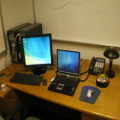Hi Brandom,
I tried to build a new model similar to what I get.
As you can see, this new model, initially there are 8 boxes (virtuals) in the rack.
in this model to pass 10 units of time, the boxes are converted into "real objects" (read boxes).
In the model, when the "virtual" boxes convert "real" objects, it is at this point that the task execute moves node 4, to be loaded.
What I am trying to do is:
1. Initially, the same, 8 boxes will be virtual.
2. I generate (8 persons) 8 flowitems ( with a source). The persons will follow the circuit (nodes).
3. At the time the person arrives at a node NN4 is when I want to convert ONE BOX a "real" object of the eight boxes. Then, crane load the box and unloaded to the person. S the same for the 8
4. the person will travel to the queue and unload the box and wiil go to synk.
thanks Brandon, for trying to help me.
Quote:
Originally Posted by Brandon Peterson

Juan,
Sorry, but I still don't know what you are trying to do. Virtual content to me means that you would use a number value instead of actual flowitems. And I don't understand what you mean by recycle an item.
Currently your model doesn't flow at all. You have people going from Queue2 to Sink 9 via the port connection. However, you have created your own task sequence that never gets the person loaded into the sink. Instead you try to unload it into the rack and then tell it to travel to the sink. There is no reason at all that that would work. First, the FRUNLOAD task needs to unload the flowitem into the object that it was intended to go to, not to some other object which you do. Second, The FRUNLOAD task should be the last task in the task sequence for a TE flowitem sent to a sink because the item would be destroyed before it could finish anything else.
If you wanted the TE flowitem to pick up an item from the rack and drop it off in the queue then you would have to check for a released item or release an item when the TE flowitem leaves Queue2 if there was an item available then you would want to include some additional tasks to travell to NN4, FRLoad the item released, travel to Queue13, and finall FRUnload the item. You would also need to make sure that the use transport button was checked on the rack and that it was not creating a task sequence.
Another way to do this would be to have the TE flowitem have a break task that would check a dispatcher for a task sequence. Then you could have the rack use the standard use transport functionality. You would need to connect the rack to a dispatcher, the same disatcher you are checking in the break task, instead of a TE.
Brandon
|






 thats not normal.
thats not normal.


